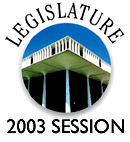
Campaign spending
bills drawing criticismThe Ethics Commission director
says changes could weaken lawsMajor efforts to reform the ethics and campaign laws are floundering at the state Legislature, according to government critics and officials responsible for administering the laws.
House and Senate conferees are considering bills to change the ethics and campaign spending laws, but the two men who administer the laws, Bob Watada, Campaign Spending Commission executive director, and Dan Mollway, Ethics Commission executive director, say the changes may actually weaken the laws.
Mollway calls the effort by the Legislature "dismal," adding that he had hoped the Legislature would expand the definition of the conflict laws to bring more scrutiny to public officials and their family members.
Legislature Directory
Legislature Bills & Hawaii Revised Statutes
Instead, the Legislature is moving to loosen the ethics laws, Mollway said Wednesday in an interview. "I have been tremendously frustrated," Mollway said.
Watada said the revisions made to the campaign spending laws that regulate how much candidates for office can raise and how they can spend it are causing concern.
"The bill is so bad we may consider asking the governor to veto it," Watada said. "I don't know why they keep making exceptions to the law -- as it stands we have some real problems."
Gov. Linda Lingle, who touted her ethical government-reform package at the beginning of this legislative session, says she has seen some progress with bills to control state purchasing or procurements, but she also is worried about other legislation.
During her State of the State speech, Lingle called for outlawing the giving of lavish gifts to public officials, including legislators. Instead of banning or controlling gifts, the Legislature is considering simply lowering the threshold for reporting so that instead of having to report gifts valued at more than $200, officials would report gifts valued at more than $100.
"The practice of giving expensive gifts to legislators and other politicians is a bad idea, and it should stop," Lingle said.
"It seems that just reporting an expensive gift is not enough. We feel there is a gracious way to tell people that even if they have the best of motives, we are just not allowed to accept expensive gifts for any reason," Lingle said.
She noted that she is the first governor in the state's history to decline the gift of honorary membership in the local country clubs, such as Waialae Country Club.
Sen. Colleen Hanabusa (D, Nanakuli-Makua), Judiciary Committee chairwoman, said she pushed through a strict campaign spending bill last year only to have it vetoed by former Gov. Ben Cayetano.
Hanabusa said this year's effort is "incremental" and that the Legislature needs to give more thought to how it wants to change the campaign spending laws.
Sen. Les Ihara (D, Kaimuki-Palolo) leveled the harshest criticism.
"I thought that more would have been done this year, but I was wrong. The bills that are still alive are anti-reform. The bills don't help the watchdogs, they help the players," Ihara said.
The Legislature's major campaign and ethics reform bills were supposed to regulate the ethical behavior of politicians, Ihara said.
"But the bills have major holes and the holes are getting wider, so instead of refining and limiting unethical behavior, it is allowing more unethical behavior," Ihara charged.
In one instance, Watada said, he was concerned to see Sen. Cal Kawamoto, who is under investigation by the Campaign Spending Commission for making donations to community groups with campaign funds, was urging changes to the law that would make the donations proper.
The concern, Watada said, is that an incumbent with a large campaign checkbook could make himself politically unassailable by using campaign money for charity donations.
Kawamoto reacted angrily to the charge, saying Watada should either move the investigation forward or drop it.
"He (Watada) has had four months, and he can't even tell me what the hell is campaign expense and what is (community) seeding," Kawamoto complained. "What the hell is he doing, hanging us out to dry?"
Watada had argued that Kawamoto's action "creates a cloud ... especially if the legislator wants to make legal what has been raised as a possible illegal action," Watada said.
State of Hawaii
